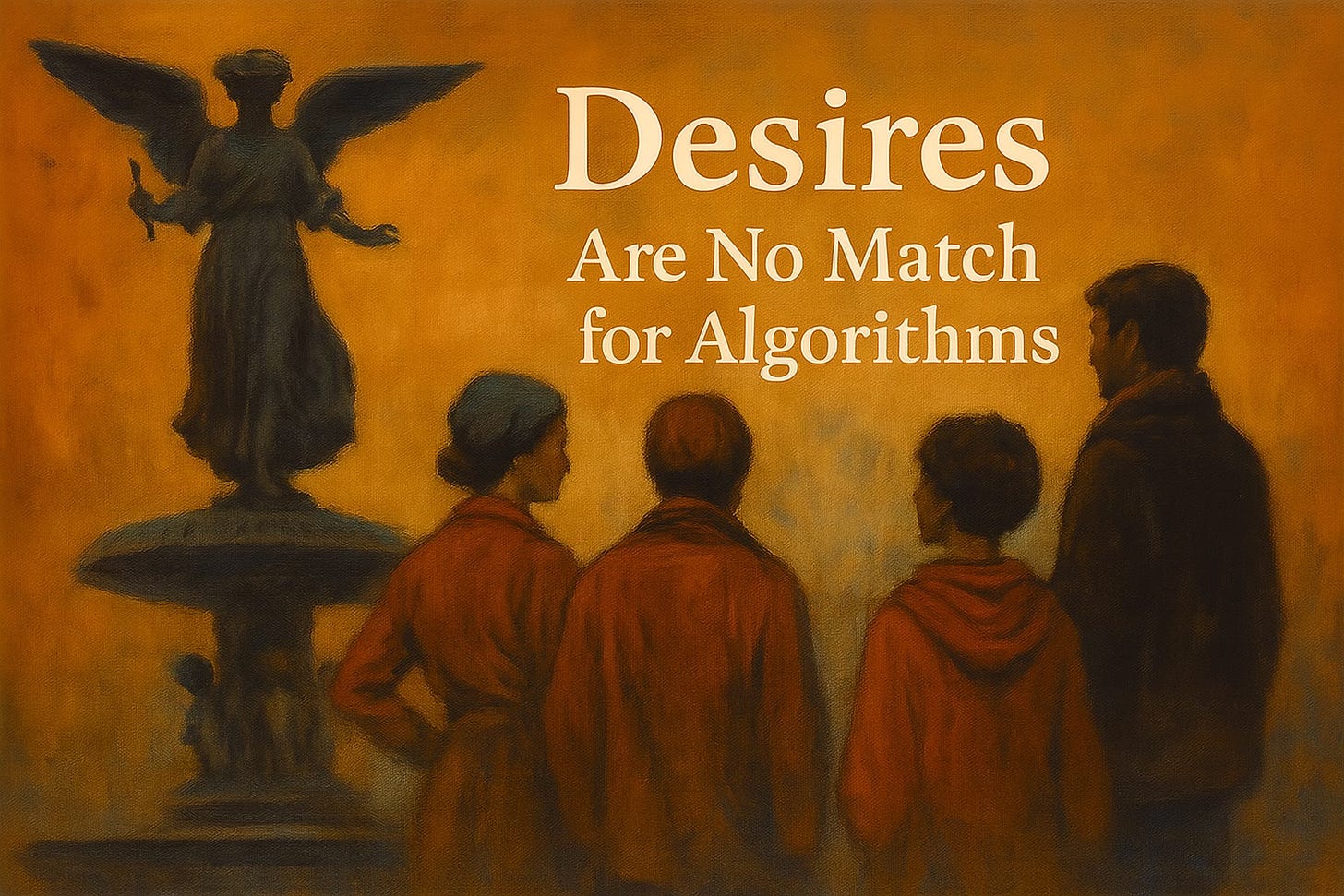Desires Are No Match for Algorithms
Why Following Your Wants is a Terrible Roadmap
From Angels in America:
Joe: “I don’t know what I want anymore.”
Hannah (Mother Pitt): “What you want, what you want—well that shifts with the breeze! How can you steer your life by what you want? Hold to what you believe.”
Here is an essential insight. Joe is caught in a modern trap: trying to orient himself based on what he wants. But his mother Hannah sees through it. She names the instability of desire: “What you want—well that shifts with the breeze!” It can’t guide you. And yet, this is the dominant mythology of modern life: follow your desires. Let want be your compass.
But desire is ephemeral. It flickers and sways. It is easily hijacked—especially now, when algorithms constantly reshape what you think you want. Your desires aren’t yours alone. They are curated, nudged, and manipulated by screens, feeds, products, and platforms. You’re not just conditioned to have wants, you’re taught to perform them, monetize them. In this chaos, steering by want is like navigating a storm with a broken compass and no map.
Belief as a More Stable Anchor
Mother Pitt offers something deeper: belief as a more stable anchor. She’s not making a theological claim. This isn’t about orthodoxy. She’s simply saying: let something more enduring than emotion shape your life.
But here’s the problem. Since the Enlightenment, “belief” has become a suspect word. It smells of superstition, rigidity, irrationality. In intellectual circles, to believe is to be naive. In popular culture, belief is often portrayed as dangerous; something for zealots or fools. The alternative we’re sold is doubt, detachment, and endless self-questioning.
I disagree. Not because belief is inherently good, but because disbelief is not a foundation. You cannot build a life on skepticism. At some point, you must choose. You must act. And every action carries with it an implicit value, an implicit story.
In TriBeing, my philosophical framework, I call this your Foundational Story: the story you choose to live by, the values you declare, and the rituals you enact. These three—Story, Values, and Ritual—form the structure of a purposeful life. And crucially, they are not meant to be private.
Internal belief is just as unstable as want. A creed kept in your head can shift as easily as a whim. You can wake up tomorrow and feel differently. Private beliefs don’t challenge you. They don’t call you back when you drift. They don’t grow through resistance. They evolve with your moods.
Tribe As Foundation
This is why TriBeing posits Tribe as foundation.
A Tribe, in my model, is a human-scale group—small enough to know and be known. A Tribe lives in shared relationship, bound by a declared Story, agreed-upon Values, and regular Rituals. Within Tribe, belief is not internal. It is spoken. Lived. Tested. Shared.
Only then can belief become something more than a passing mental state. It becomes embodied. It gains weight. It becomes real.
Modern humans are highly individualized, each person a unique island of purpose and personality. But that’s mostly illusion. In truth, most humans are constantly shaped by forces they don’t even perceive: media, marketing, trauma, politics, platforms. You are being formed. The only question is: by whom, how, and to what end?
If you don’t choose a community where your beliefs are tested and lived, you will be shaped by forces that do not care about you.
This is what Tribe restores: a chosen community that helps define and refine what matters. Not because everyone agrees on every point, but because they agree on the need for a foundation. And because they love each other enough to hold one another accountable to it.
Without this shared ground, belief remains soft. It bends to convenience. And modern life is full of convenience. Flexibility is mistaken for freedom. Self-expression is mistaken for transcendence. Novelty is mistaken for wisdom.
The Peter Pan Effect
I see the Peter Pan effect everywhere: people clinging to the illusion of self-discovery while avoiding any true submission to something larger. They treat life as an endless playground for the self: my pain, my growth, my healing, my journey. But the path of the lone hero is a fantasy. Joseph Campbell understood that. The hero’s journey ends not in “finding yourself” but in the return to Tribe—ready to share your gift.
There are a rare few who can build a foundation entirely on their own. But they are the exception. For most, meaning requires community. Purpose requires practice. Identity requires mirrors.
Even a small Tribe, such as family, can begin to serve this function. Raising a child is often the first time many experience a purpose larger than the self. For all the demands of parenthood, it provides something the individualist path cannot: Belonging. Lliving, breathing, story. You are no longer your own protagonist. You are part of something that unfolds with and through others.
The paradox is this: to truly become yourself, you must surrender parts of yourself. Not to an institution, not to an ideology, but to a living group of people who love you enough to see you clearly, reflect you back, and hold you to your own values when you falter.
That is what Tribe offers. And that is what belief needs to become real.
Want is ephemeral. And belief, if kept private, is fragile.
But belief lived in community, grounded in ritual, chosen with intention?
That can become a foundation. That can endure.

